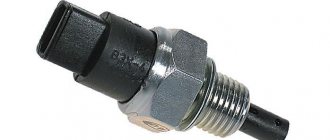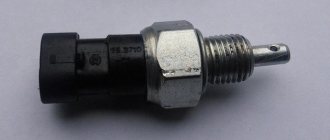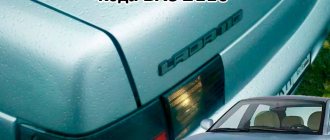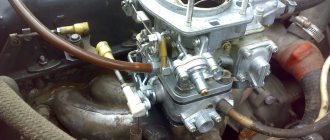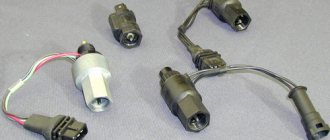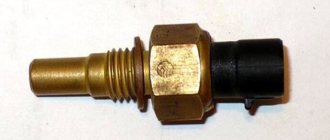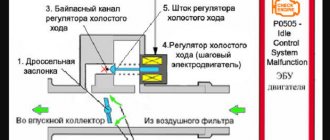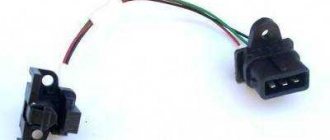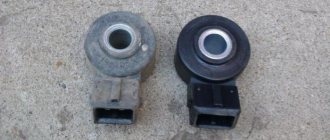On all modern cars, including VAZ models, if you shift the gearshift lever to reverse gear, the corresponding indicator lights up in the lights. If the reverse sensor of a VAZ 2109 or another model is faulty, the light will work intermittently or will not function at all. What could be causing this problem? How to check the device and replace it? More on this below.
Why doesn't the light come on?
Before changing the sensor, you need to figure out whether it really is the problem. The reverse gear may not light up due to the following problems:
- The light bulbs have become unusable. They need to be tested with a multimeter;
- Wiring is damaged. In this case, you will need a multimeter to check all the wires. It is possible that the insulation is damaged, causing a short circuit (short circuit);
- No regulator contact. This happens due to a breakdown at the point of contact between the sensor and the socket. It can be checked visually;
- There is a problem with the fuse. The 2109 reverse sensor may not function due to a blown fuse. On older cars, you need to check element F16 in the block, in others - fuse number 5;
- Sensor malfunction. If, after correcting the problems described above, the lights still do not light up, then the sensor is not functioning.
Examination
It is easy to check the serviceability of the reverse lamps. You need to disconnect the wires suitable for the device, then connect them together (for example, with a piece of wire). If the headlights come on, then the sensor is faulty and needs to be replaced.
Frequent breakdowns are associated with deterioration in the quality of sensor manufacturing. Over time, its tightness is broken, and oil gets inside. Many inexperienced car enthusiasts associate this with different fuel supply systems - carburetor or injector. But this has nothing to do with this malfunction. You just need to monitor the condition of the sensor from time to time.
How to check the sensor
To check, you need to get close to the element. The following actions must be taken:
- Raise the car with a jack or on a lift;
- Remove the engine protection;
- Get to the sensor, which is located on the side of the gearbox housing;
- Put in reverse gear;
- Check the continuity between terminals 1–3 and 2–4, make sure that it is also present at the “neutral”;
- Shift into other gears and check for continuity, there shouldn't be any.
If there is always continuity, the reverse sensor of the VAZ 2109 is faulty and needs to be replaced.
What kind of lamps are there?
Now a few words about the lamps used in the rear light of the VAZ 2109. The A12-5 (T5W) bulb with a power of 5 W is responsible for the side lights.
T5W bulb, responsible for the side light of the VAZ 2109
All steel lamps - direction indicator, fog light, reverse indicator and brake light - are of type A12-21-3 (P21W). Their power is 21 W.
What kind of lighting do you prefer?
Built-in Chandelier
Instructions for replacing light bulbs
It's time to learn how to change lamps yourself so as not to waste extra money and your time on trips to a car service center. Open the trunk lid and find the rear part of the lights. Disconnect the power supply.
Removing the power supply from the rear light of a VAZ 2109
Press the side latch that secures the light fixture. The latch is located on the side of the light device, which is closer to the central axis of the car.
The back of the lamp is secured using side latches
We take out the back part of the flashlight along with the circuit board and bulbs.
Removing the rear part of the right lamp VAZ 2109
Removed module with lamps
We find the burnt-out light bulb, guided by the photo in the section “Pinout of connectors and design of lamps”, turn it counterclockwise, and remove it. Fix the new lamp by turning it clockwise. We install the module in place, connect the power supply.
Important! On some modifications of the VAZ, the trunk has padding or a protective cover covering the circuit board. We partially dismantle the first one, bend it over, and remove the cover. It is fastened with two thumbscrews located diagonally (VAZ 2109) or using a rotary latch (VAZ 21099 sedan).
Cover covering the rear part of the lamp VAZ 2109 (left) and VAZ 21099
Replacement of reverse sensor VAZ 2109
Replacing the reverse sensor on a VAZ 2109 is a simple process. Experienced car owners can do everything without difficulty.
The following actions must be taken:
- Place the car on a pit or a lift; in extreme cases, use a jack;
- Remove the (–) terminal from the battery for safety (it is labeled);
- Drain the transmission oil for convenience, otherwise it will leak after removing the product. You will need to unscrew the drain cap, first replacing the container;
- Remove the engine protection;
- Find the sensor, which is located on the side of the gearbox housing, disconnect the terminal from it;
- Unscrew the clamping bolt to “22”. It is located on the crankcase;
- Take a new sensor, lubricate its seal with oil and install it by tightening it by hand and then with the head;
- Connect the wire block;
- Fill with transmission oil. If it has not been changed for a long time, it is better to fill it with a new one;
- Check the lubricant level;
- Install engine protection, remove the car from the jack;
- Connect the terminal to the battery;
- Turn the ignition key, set the lever to the reverse position to turn on the light, check operation.
After all this work, the reverse light on the VAZ 2109 will be in good working order. It is advisable to check the functionality on the go, making sure that it is in full working order.
The principle of operation of the brake light
The brake lights are located at the rear of the car. Red lanterns. They light up automatically if the driver brakes. When the driver takes his foot off the brake pedal, they are also automatically turned off. The presence of stops is mandatory for vehicles.
The lights should be located symmetrically and burn brighter than the side lights. Brake lights are installed on the sides, on the rear window, in the center above the line of the side stops.
Primary and secondary brake lights can be a single bulb, a neon tube, or a set of LED bulbs. The car enthusiast is additionally equipped with a brake light repeater. The rear brake light can also serve as a fog light. You can install a formula 1 brake light (the author of the video is Mikhail Ermolaev).
Causes of failure
Before you start replacing the reverse sensor (RDS), we recommend checking the condition of the rear lights and determining whether the signal may not be working for other reasons.
Possible reason
Your actions
A common and fairly banal cause of problems, which, nevertheless, many ignore. Take out the light bulb, arm yourself with a multimeter and check if they have burned out. Replace if necessary
The problem is no less common, but looking for the source of the problems in such a situation is a little more difficult. You will also need a multimeter, which you need to test the wiring and check the resistance readings
Poor regulator contact
It happens that during operation the contact of the sensor with the socket is broken. Lack of contact means that the device will not work normally. So check its condition
Wiring insulation is broken
If the insulation on the wires near the sensor is broken, this can lead to a short circuit. The result is quite obvious, so check the condition of the wiring and replace it if necessary
Depending on the type of fuse box, check the condition of the corresponding element in the mounting block. On old-style blocks this is fuse F16, and on new-style fuse blocks you should look at fuse 5. If they are melted, they will need to be replaced. But it is also important to determine the reason why the fuse blew
A failure of the reverse control itself may be indicated by a situation where the lights do not light up at all or, on the contrary, light up without interruption. In the second case, the option of burnt out light bulbs is excluded by itself.
Symptoms of a problem
Under no circumstances should you ignore signs of failure of the idle speed sensor on your injection or carburetor VAZ 2109. This will make driving uncomfortable at first, but can soon cause a serious accident.
There are several main symptoms that may indicate problems with ICC:
- The revolutions spontaneously begin to increase and decrease;
- When turning on a cold power unit, the speed does not increase;
- When using additional electrically dependent devices, such as headlights or a heater, the speed immediately begins to drop at idle;
- When shifting gears or idling, the engine may stall.
This is not a complete list of possible symptoms, but they are all indirect. Therefore, to make sure that the problem lies precisely in the IAC, and not in other engine components, it is necessary to check the current state of the sensor.
Checking status
To check the current state of your IAC on a VAZ 2109 car, follow several sequential steps.
It will be useful: Advice from an auto expert on how to decipher error code 13456 on an opel zafira
Verification step
Your actions
Apply the handbrake on the car and install chocks under the wheels. Safety should always come first when doing DIY car repairs.
You need to get to the sensor you are looking for, disconnect it from the power supply with wires, and then use a voltmeter to check for voltage. The minus is placed on the engine, and the plus is installed on the terminals of the wire block A and D
Turn on the ignition, check the voltage readings. Normally they are about 12 Volts. If the voltmeter shows lower values, there may be a problem with the battery charge level. If there is no voltage at all, you will have to check the entire computer and electrical circuit. Breaks are possible.
Carry out another test with the ignition on. Check terminals AB and CD one by one. In normal condition, the resistance across them should be approximately 53 ohms. If the IAC is working normally, the meter will show infinite resistance
With the idle speed control removed and the ignition on, connect the power supply to it. If at the same time the conical needle moves out, everything is fine with the device. If the cone-shaped needle does not extend, then the IAC is out of order and requires replacement
Having determined that the old idle speed sensor has already served its purpose on the VAZ 2109, it needs to be replaced. The procedure is completely doable without outside help.
Removing the IAC
Characteristics of the XX controller
This part is designed to reduce the engine warm-up time. During this operation, rubbing parts often wear out quickly. So: DXX is also designed to reduce contact and wear. This device is mounted in the throttle assembly, which is located in the engine compartment on the left side of the engine.
It will be useful: Site map
Purpose and principle of operation
Main components of the device:
- stepper electric motor;
- conical needle combined with a rod;
- springy part.
Idle speed sensor As shown in the photo, the device has blocks.
The main mechanism is highlighted in red - the idle speed sensor VAZ 21099 injector. The adjusting part that controls the engine speed is visible in gray. Blue – a device designed to read information about the crankshaft rotation speed. If the operation is idling, the air flow enters the main cylinders through special channels. The green color in this diagram is responsible for comparison in the electronic unit. Here the engine speed is taken into account in accordance with the actual speed.
The coolant temperature sensor also receives the necessary signal. Until the comparison circuit receives the necessary information, the engine will operate at higher speeds. At this time, the air is adjusted using the conical part of the needle. A disruption in the air supply often leads to breakdowns and a complete stop of the motor.
Drawing a conclusion, we can say that a certain amount of air enters the engine - exactly as much as is needed for operation in a suitable mode. This volume is taken into account by a special air flow meter. It transmits information to the controller, which, depending on the value, prepares the mixture at the required concentration. After this, it is injected through the injector nozzles into the vehicle network. You can find out where the idle speed sensor is located on the VAZ 21099 injector in the photo below.
Typical faults
Popular and frequent breakdowns of the VAZ 2109 carburetor and injector idle speed sensor include the following:
- engine malfunction;
- refusal to act when the gas pedal is released;
- uncontrolled idling, even when the engine is warm;
- when the gear is switched off, the engine stalls;
- when the engine is cold, the crankshaft does not increase rotation (video author - Devyatochka.remont).
Messages 11
1 Topic by Andrey08 2009-12-16 13:01:12
- Andrey08
- User
- Offline
- Registered: 2010-08-11
- Posts: 91
- Reputation:
Topic: Not Working: All Tidy, Wipers, Fern Guard on VAZ 21099
My friend has a VAZ 21099 injector.
And recently the following happened: all the instrumentation stopped working (speedometer, tachometer, etc.), the wipers and ferns do not work. the headlights seem to come on
Today I talked to him, they say in the morning everything worked fine, but in the afternoon it immediately turned off right on the go.
I advised him to pay attention to the fuse box (they say the frost has hit, condensation is forming or it’s just wet). I would like to hear your opinion, what do you think about this? mb has this happened to anyone?
I would like to hear your opinion, what do you think about this? mb has this happened to anyone?
2 Reply from maik 2009-12-16 19:38:20
- maik
- User
- Offline
- Registered: 2008-11-25
- Posts: 187
- Reputation:
Re: Not working: All tidy, wipers, fern on VAZ 21099
My friend has a VAZ 21099 injector.
And recently the following happened: all the instrumentation stopped working (speedometer, tachometer, etc.), the wipers and ferns do not work. the headlights seem to come on
Today I talked to him, they say in the morning everything worked fine, but in the afternoon it immediately turned off right on the go.
I advised him to pay attention to the fuse box (they say the frost has hit, condensation is forming or it’s just wet). I would like to hear your opinion, what do you think about this? mb has this happened to anyone?
I would like to hear your opinion, what do you think about this? mb has this happened to anyone?
You can also check the ground on the tidy. (mass is strength))) all troubles come from it.
3 Reply from ils 2009-12-17 06:58:25
- ils
- User
- Offline
- Registered: 2009-06-16
- Posts: 540
- Reputation:
Re: Not working: All tidy, wipers, fern on VAZ 21099
I agree with maik - most likely the mass has moved away. It is attached under the dashboard above the place where the steering shaft is screwed to the body. The second place is the ignition switch relay. I’ve seen two types of such relays - some have a tongue that needs to be screwed to the body (there is one in the engine compartment - it looks like a starter relay), the second has a black wire - it should go somewhere to the body. I checked it on the pile - as soon as the mass disappeared from this relay, the entire tidy died, the wipers also did not work.
4 Reply from SokolOFF 2009-12-17 08:38:33 (2009-12-17 08:42:23 edited by SokolOFF)
- SokolOFF
- User
- Offline
- Registered: 2008-12-25
- Posts: 624
- Reputation:
Re: Not working: All tidy, wipers, fern on VAZ 21099
Judging by the quantity of everything at once, I dare to guess:
- ignition switch contact group
- one of the pads (it seems red) flew out of the block on the passenger compartment side
-a flooded block is also an option
PS I would check in just this order)) Well, first, of course, a visual inspection of the block. As for the mass, IMHO, it’s unlikely. After all, the headlight switch in the same place takes a lot of weight.
By the way, I just remembered another question: are “headlights” HEADLIGHTS (low beam, high beam) or dimensions? And does the car even start? Simply, if the lights are on, but the car does not start, then 90% of the ignition relay is either a contact group (or their wiring). I had such a case.
5 Reply from Andrey08 2009-12-17 09:37:00
- Andrey08
- User
- Offline
- Registered: 2010-08-11
- Posts: 91
- Reputation:
Re: Not working: All tidy, wipers, fern on VAZ 21099
- ignition switch contact group
- one of the pads (it seems red) flew out of the block on the passenger compartment side
-a flooded block is also an option
PS I would check in just this order)) Well, first, of course, a visual inspection of the block. As for the mass, IMHO, it’s unlikely. After all, the headlight switch in the same place takes a lot of weight.
By the way, I just remembered another question: are “headlights” HEADLIGHTS (low beam, high beam) or dimensions? And does the car even start? Simply, if the lights are on, but the car does not start, then 90% of the ignition relay is either a contact group (or their wiring). I had such a case.
an acquaintance stopped by the service center, they told him that they needed to replace the fuse flare, they say it flew
Video
A video from the Garage channel demonstrates the removal of the switching mechanism on an already partially disassembled box.
Do you have any questions? Specialists and readers of the AUTODVIG website will help you ask a question
Was this article helpful?
Thank you for your opinion!
The article was useful. Please share the information with your friends.
Yes (76.92%)
No (23.08%)
X
Please write what is wrong and leave recommendations on the article
Cancel reply
Rate this article: ( 14 votes, average: 4.57 out of 5)
Discuss the article:
